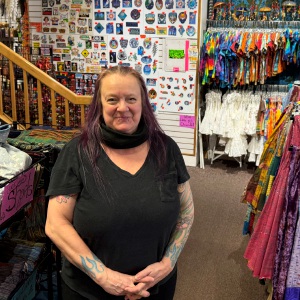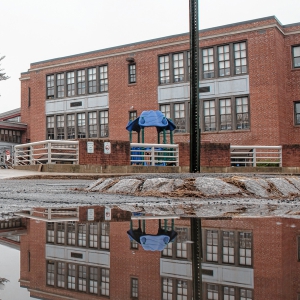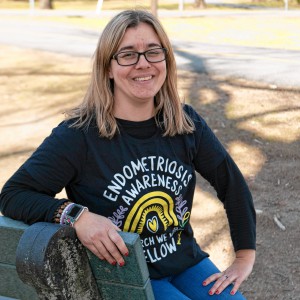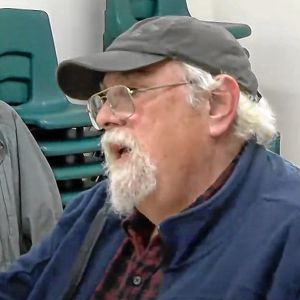1989 homicide victim found in Warwick ID’d through genetic testing, but some mysteries remain
| Published: 05-03-2024 11:38 AM |
GREENFIELD — It took nearly 35 years, but the human remains found just off Route 78 in Warwick in 1989 have been identified as belonging to Constance (Holminski) Bassignani, who was 65 years old at the time of her murder.
The Northwestern District Attorney’s Office held a press conference Thursday morning to announce that the victim’s identity was learned about eight months after her DNA was submitted to Othram, a Texas corporation that specializes in using forensic genetic genealogy to resolve unsolved murders, disappearances and identification of unidentified decedents or homicide victims.
According to the DA’s office, Bassignani was born in Hawaii in 1924 and was living with her second husband, William Bassignani, in Woonsocket, R.I., at the time of her death. William reportedly told family that she had moved back to Hawaii, though the DA’s office stated investigators found no evidence of this. William, who died in 1993, is considered a person of interest in the case.
The State Police Detective Unit attached to the DA’s office collaborated with the State Police Crime Laboratory to submit the genetic material to Othram. This led to living potential relatives, who submitted their own DNA and confirmed the victim’s identity.
“We’re all very appreciative of the dedication, the hard work and the perseverance in this case,” Northwestern District Attorney David Sullivan said. “Seeking justice for the unknown victim has been their driving force from Day 1.”
Bassignani’s body was found on June 24, 1989, by a passing motorist. Her remains were 10 to 20 feet off Route 78, in a lightly wooded area near a small gravel pit about 1½ miles south of the New Hampshire state line and about the same distance north of the entrance to Mount Grace State Forest. Sullivan said local and State Police responded to the scene, documenting evidence and collecting the remains.
First Assistant District Attorney Steven Gagne explained that identifying the victim is the first step in any homicide investigation.
“From there, investigators can determine who the victim’s circle of family, friends and co-workers were and attempt to retrace their last known steps and contacts,” he said. “In this case, investigators were hampered from the start in their efforts to solve this homicide without an identification of the victim.”
Article continues after...
Yesterday's Most Read Articles
 Long-vacant former Faces spot in Northampton gets new tenant
Long-vacant former Faces spot in Northampton gets new tenant
 Here come the sweetness: Four new businesses prepping to open in downtown Northampton
Here come the sweetness: Four new businesses prepping to open in downtown Northampton
 Local ‘Hands Off!’ standouts planned as part of national effort
Local ‘Hands Off!’ standouts planned as part of national effort
 Northampton schools probe staff response to student’s unfulfilled IEP
Northampton schools probe staff response to student’s unfulfilled IEP
 Area property deed transfers, April 4
Area property deed transfers, April 4
 Sabadosa, Velis push for state endometriosis task force to raise awareness about little-known illness
Sabadosa, Velis push for state endometriosis task force to raise awareness about little-known illness
Gagne said investigators have learned Bassignani was married and divorced in the 1940s before marrying William in 1945. Authorities have tracked down and spoken with the three grandchildren born to a son that has died, as well as a daughter who lives on the West Coast. Gagne said the DA’s office was assisted by law enforcement in Washington state and in Hawaii.
“So this investigation, which is now reinvigorated, has literally spanned half the globe,” he said.
Gagne explained that Bassignani and her husband lived in an apartment in Woonsocket, approximately 80 miles from Warwick. The couple had previously lived in Franklin, Massachusetts. Sullivan said there is no known connection between the couple and Warwick, and it is unknown where the murder took place.
According to the DA’s office, the victim was last seen alive on Memorial Day weekend in 1989. Gagne said William reportedly told relatives that his wife had decided to move back to Hawaii “and that they would not be seeing or hearing from her again.”
Gagne said he hopes this news provides some closure to the victim’s family, shedding “some light on what may have been a looming cloud of doubt surrounding her disappearance for decades.”
Retired Warwick police chief Brian Peters, who was at the department’s helm in 1989, said it is refreshing to get some answers.
“It’s a big relief,” he said. “[We] never had anything like this happen in town, and hopefully never will [again].”
Paul Marguet, the State Police’s lead investigator on this case, said the victim’s grandchildren initially did not believe authorities, having long believed their grandfather’s story about his wife’s abrupt disappearance. But, he said, their DNA was used to confirm the truth.
Michael Vogen, an Othram representative, appeared via Zoom during Thursday’s press conference and lauded the DA’s office and the State Police before briefly speaking about his company’s mission.
“We were purpose-built to do just this,” he said. “That’s to generate human ID from forensic evidence.”
Gagne previously told the Greenfield Recorder the decision was made to reach out to Othram due to the company’s success in identifying the so-called “Granby Girl” as Patricia Ann Tucker, a 28-year-old woman found shot to death in 1978, but who went unidentified until a little over a year ago. Gerald Coleman, Tucker’s husband when she died, is a person of interest in that murder. He died in state prison in 1996, and prosecutors say he never reported his wife as missing.
Othram also helped identify the “Lady of the Dunes” — a 37-year-old woman found murdered in Provincetown on July 26, 1974 — as Ruth Marie Terry. Her now-deceased husband, Guy Muldavin, was officially named as the killer in August 2023.
David Mittelman, founder and CEO of Othram, previously told the Recorder that his company tests DNA based on hundreds of thousands of markers, whereas the FBI’s Combined DNA Index System (CODIS) uses 20. He also said victims are often not in CODIS because it was designed about 30 years ago to track the repeat offenses of known criminals.
Mittelman also said that Othram, which employs 60 people, can work from evidence generally considered unusable because it is too old or too degraded.
Gagne mentioned that authorities hope to bring renewed attention to the Warwick case and trigger some new leads that have a domino effect that ends with additional answers. Anyone with information that might be helpful in this case is encouraged to call the State Police Detective Unit attached to the Northwestern District Attorney’s Office at 413-512-5361. Messages can also be submitted anonymously through northwesternda.org.
“It’s like we’re trying to piece together an ancient puzzle here,” Gagne told reporters, “but any small piece would certainly help.”
Reach Domenic Poli at dpoli@recorder.com or 413-930-4120.













 A father’s dream to be the best: Twelve men graduate from Nurturing Fathers program
A father’s dream to be the best: Twelve men graduate from Nurturing Fathers program McGovern co-sponsors bill that aims to stop ‘backdoor’ cuts to SNAP benefits
McGovern co-sponsors bill that aims to stop ‘backdoor’ cuts to SNAP benefits Hatfield Select Board removes elected Housing Authority member
Hatfield Select Board removes elected Housing Authority member Final interviews set for Granby school superintendent candidates
Final interviews set for Granby school superintendent candidates
